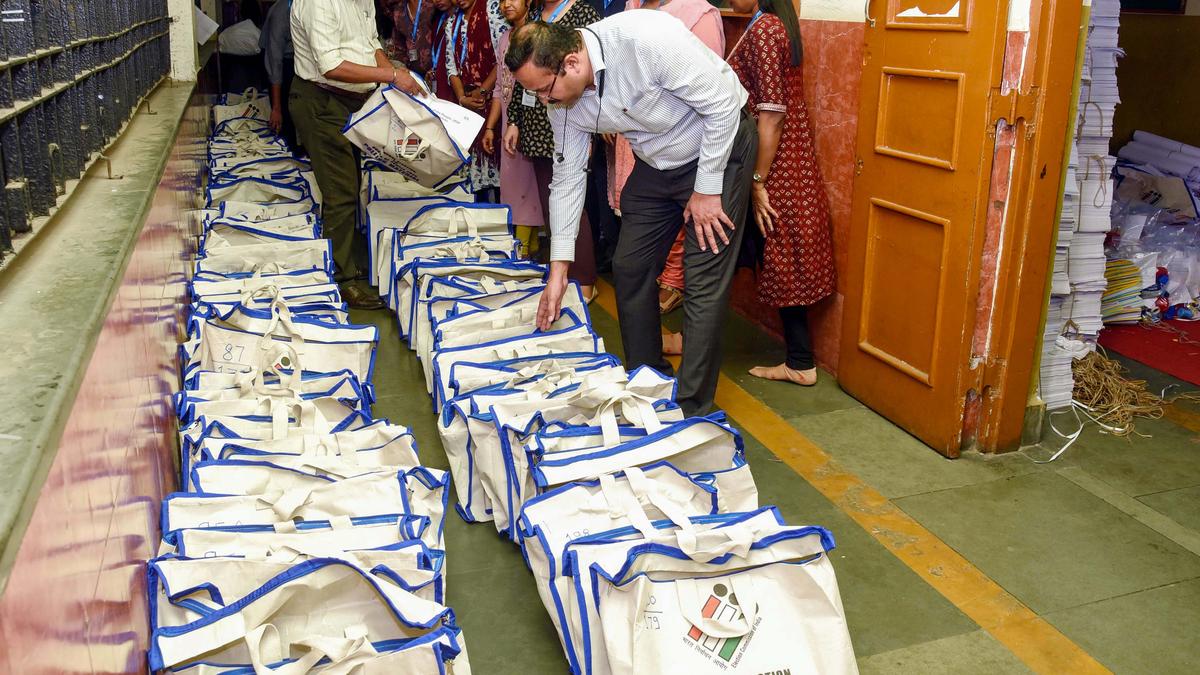"If you would have given us jobs, we would have been able to buy these sarees ourselves. Who is Modi government to give us sarees? Are we your wives? You think we cannot buy our own clothes? We will buy better sarees than these. We want work, we are hardworking. We are not sitting at home," said Ladkubai (52), a local from Vasantwadi village, a tribal hamlet in Maharashtra's Palghar.
Vasantwadi, a village with about 250 families undertook a small but very significant rebellion earlier in April.

A local fills water in utensils at the local hand pump in Vasantwadi, Palghar, Maharashtra.
(Photo: The Quint)
A few days before the elections were announced and the Model Code of Conduct (MCC) kicked in on 16 March, people across several villages received these bags and sarees at the local ration outlets while they went to avail the free food grains under the Centre's PMGKAY scheme.

Local women from Vasantwadi in Maharashtra's Palghar show one of the sarees they received under the state government's scheme
(Photo: The Quint)
In November last year, the Maharashtra government launched a scheme to provide free sarees to women holding the 'Antyodaya' ration cards every year during a festival of the government's choice till 2028.
On 3 and 8 April, scores of tribal women from across 23 villages in Palghar, led by social workers and activists, marched to the Jawhar and Dahanu tehsildar offices and returned over 300 of these sarees and 700 of these bags.

In April, scores of tribal women marched to the Jawhar and Dahanu tehsildar offices and returned over 300 of sarees and 700 bags distributed by the government.
(Photo: The Quint)
'No Water Supply, No Jobs, What do we Do with Free Sarees?'
Villagers questioned the rationale behind getting free sarees and bags while the village lacked the most basic facilities.
"We don't want these sarees and bags. For water, we have wake up at 4 am or 5 am sometimes. There are no lights here but we still wake up at 4 am to fetch water. Moreover, the roads are bad. You have to walk for at least 30 minutes to the nearest borewell to get water sometimes. We carry two-three pots on our heads, another on the waist. This is the situation. We need taps in every home," said Mamta Vattha (22).

Ladkubai (left) and Mamata Vattha show the bags they received at the ration shop in March. The bag bears a picture of PM Modi along with an advertisement of the Pradhan Mantri Garib Kalyan Yojana (PM-GKAY).
(Photo: The Quint)
Ladkubai echoed Mamta's demands.
While lack of employment opportunities and better schools is a problem faced by all, the two major issues that concern the women the most is access to water in their homes and easier access to healthcare.
"Our local hospital does not have a good doctor. If you take a pregnant woman there, there isn't a female doctor either. We either have to go to Ganjed, Silvasaa, or Valsad," Ladkubai said.

Local hospital at Vasantvadi village, Palghar, Maharashtra.
(Photo: The Quint)
'We Are Citizens, Not Beggars'
Women from the 23 villages were assisted by a social work group Kashtakari Sanghatana in carrying out the demonstrations. The organisation has been helping create awareness in tribal villages on the importance of voting, the issues that they must actually vote on, registering voters, and ensuring paperwork.
Madhubai Dhodi (56), a social worker associated with the group said free sarees won't ensure 'vikas'.
You give one saree in a year which is not going get us any development. The government has made promises under 'Har Ghar Nal' yojana. You go and see if there are any taps in any of the houses. They built water tanks and wells but there are no pipelines to people's homes," Dhodi said.

Brian Lobo, a social worker associated with Kashtakari Sanghtana.
(Photo: The Quint)
"They claim Sabka Saath Sabka Vikas. Where is the vikas? Hence, we returned these sarees and bags. We also gave them in writing the reasons behind returning them," she added.
Brian Lobo (61), one of the founding members of the group said that the government needs to spend money on more schemes for upliftment of the tribals.
"So, much money was spent by the Modi government for this kind of advertisement. The distribution of the bags happened before the MCC but when will they be used? Even after 16 March. It meant that these things would get used even during the MCC and would lead to free campaigning for them," Lobo alleged.
"These things have been distributed without looking at what people actually need. See, we are saying that there should be schemes. But there are two types of schemes. One is the kind wherein you take the benefits of the schemes for your upliftment. But these types of schemes in which you are distributing freebies, it is not a development scheme, it is a scheme for beggars. We are humans, we are not beggars. We are citizens, we are not beggars," Lobo said.

Ladkubai narrated how most villagers have never been able to get proper jobs and have to leave the village for days in search of employment.
"We earn very little by farming. We have to go to Dahanu to find work sometimes. Sometimes we get work on people's farms. It pays us Rs 150 per day. How will that suffice? Sometimes we go up to Gujarat, Surat, Wapi to find work," she said.
"If the government gave us jobs in villages, why would we have to go? The government didn't give us jobs but it's giving us sarees," Ladkubai said.
(At The Quint, we are answerable only to our audience. Play an active role in shaping our journalism by becoming a member. Because the truth is worth it.)

 2 weeks ago
100
2 weeks ago
100


